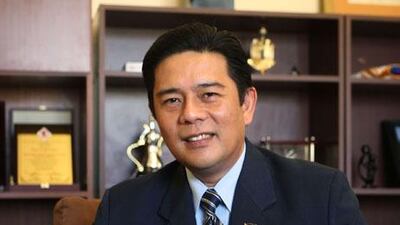ABU DHABI // Adelio Angelito Cruz admits one of the misconceptions about diplomats is that they lead privileged lives.
But the 43-year-old first secretary and consul general of the Philippine embassy says what he loves most about his job is sleeping soundly at night, knowing that he was able to serve his countrymen.
"There's this notion that diplomats tend to party all night, drink wine and wear expensive suits and tuxedos. But that impression is totally wrong," he said. "I've woken up in the middle of the night to rescue Filipinas, waited in the court room for many hours, and visited Filipinos in detention centres," he said.
"But I'm happy to be doing something fulfilling every single day of my life."
His career and life could have taken a rather different turn in his home country.
"I come from a family of engineers," he said. "My father is a mechanical engineer and his four brothers are engineers. I also have an aunt who's an engineer. They were actually disappointed that I didn't become an engineer."
But another career path beckoned as a lawyer. Mr Cruz was in his first year in law school when he was offered a job at the US Embassy in Manila. One of his tasks was to manage the interview schedule of visa applicants.
"The American consuls and I became good friends. They encouraged me to take the foreign service exams in 1994," he said.
"Back then, I was in two minds: to continue my law studies or take the foreign service exams," he said.
"I told myself that if I failed, it only meant one thing - that I was destined to become a lawyer.
At 28, he passed the qualifying exams and later hurdled the written, oral and psychological exams. He was tested in English, Filipino, world history, international economics, Filipino social and economic conditions, current events and a third language. "From 2,000 applicants, only 24 of us passed the exams," Mr Cruz said.
Some of the applicants held master's degrees and doctorates but failed, he said. "They forgot to add fractions and their patinig [vowels] and katinig [consonants]."
Mr Cruz joined the foreign service 15 years ago and he landed his first foreign assignment two years later when he was posted to Chicago.
He served as the vice-consul and later the consul at the Philippine consulate, which handled the interests of more than 350,000 Filipinos in 12 states in the Midwest.
Following a three-year stint at the Department of Foreign Affairs in Manila, his second foreign posting brought him to Abu Dhabi in March 2007.
His work at the embassy involves assisting Filipinos in need of help among the 500,000 to 600,000 nationals who live in the Emirates. About one-third of that population reside in Abu Dhabi and Al Ain.
"Filipinos here are very hard-working. I've met people who have been here for more than 30 years and they succeeded in providing a better life for their families," he said. "The only downside is that many Filipinos are facing increasing problems with debt."
Earlier this year, Grace Princesa, the ambassador, disclosed plans to collect data that would determine the extent of this debt.
The embassy assists its nationals by recommending them to the foreign affairs department in Manila who provide the Legal Assistance Fund (Laf) to secure the services of a law firm. Laf covers both the legal defence and prosecution of cases involving Filipinos overseas.
Mr Cruz added the Philippine government invests heavily on its assistance to nationals with an aim to protect the rights and welfare of Filipinos overseas. For Mr Cruz, this works breaks down to a hectic schedule crammed into a five-day week. He takes his children to school at 7am, goes to work at the embassy in Al Bateen at 7.30am, and leaves the office after 5pm.
Occasionally, he attends community functions in the evenings and on weekends. He also joins his staff during weekends to provide passport and notarial services to Filipino expatriates in Al Ain and the Western Region.
Jasmine Aragon, a consular staff at the embassy, described the consul-general as "very patient" with his staff and a "hands-on" boss.
As well as helping those in need, Mr Cruz admits there are other perks to the job such as travelling, the opportunity to meet people, and bringing his family with him on his foreign postings.
"The UAE is a nice place to raise children," he said. "The children here learn to respect their elders. And Emiratis are warm and cordial people."
Away from the job, he relaxes with golf and bowling, as well as cycling with his wife and three children along the Corniche during weekends.
"We all head down there on Saturday with our bikes," he said. "It's an ideal place to walk or cycle and enjoy the scenery."
And then, with the eloquence of a skilled diplomat, he pays tribute to his current workplace and home.
"I must commend the Emiratis' desire to continuously develop their country into one of the first world Middle Eastern countries," he said.

